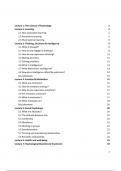Class notes
Lecture notes Introduction to Psychological Theories (PSMIN11 minor)
- Course
- Institution
- Book
This document contains all lecture notes of the course Introduction to Psychological Theories. It includes a table of contents, making it easy to find the information you're looking for. Additionally, it contains information from the required chapters of the textbook 'Psychological Science'.
[Show more]



